Unit 1 Past and Present Grammar 2(共21张PPT)
文档属性
| 名称 | Unit 1 Past and Present Grammar 2(共21张PPT) |

|
|
| 格式 | zip | ||
| 文件大小 | 412.2KB | ||
| 资源类型 | 教案 | ||
| 版本资源 | 牛津译林版 | ||
| 科目 | 英语 | ||
| 更新时间 | 2014-02-27 00:00:00 | ||
图片预览



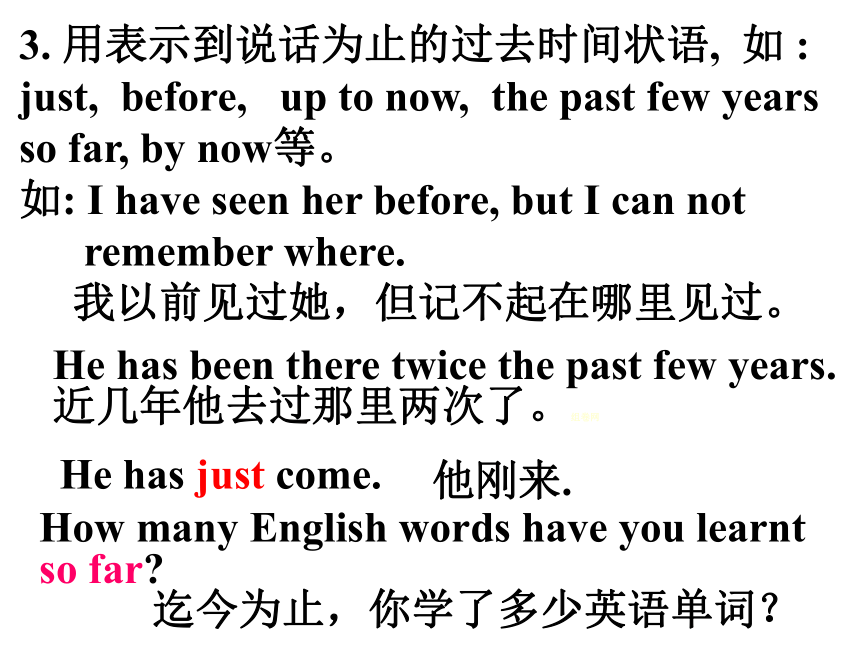
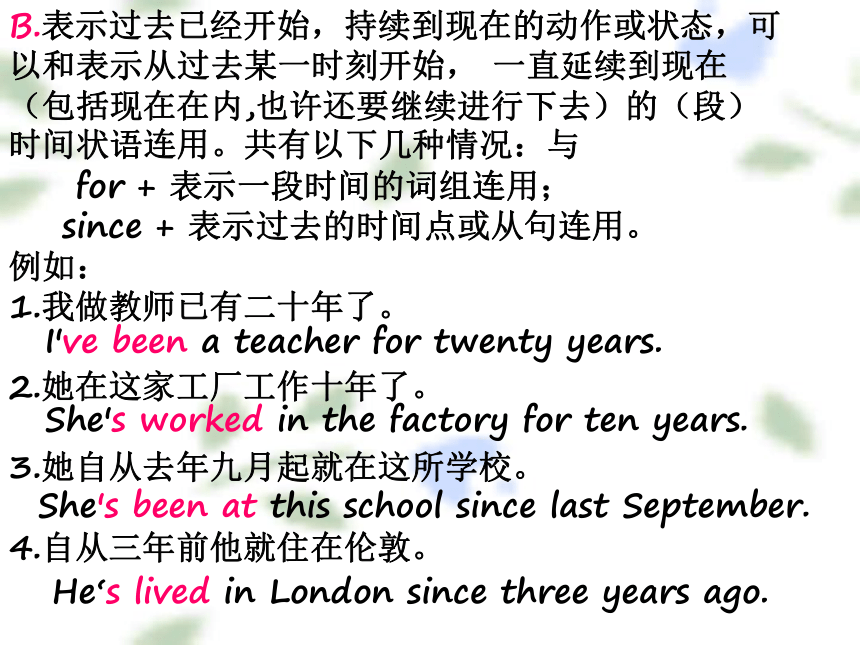
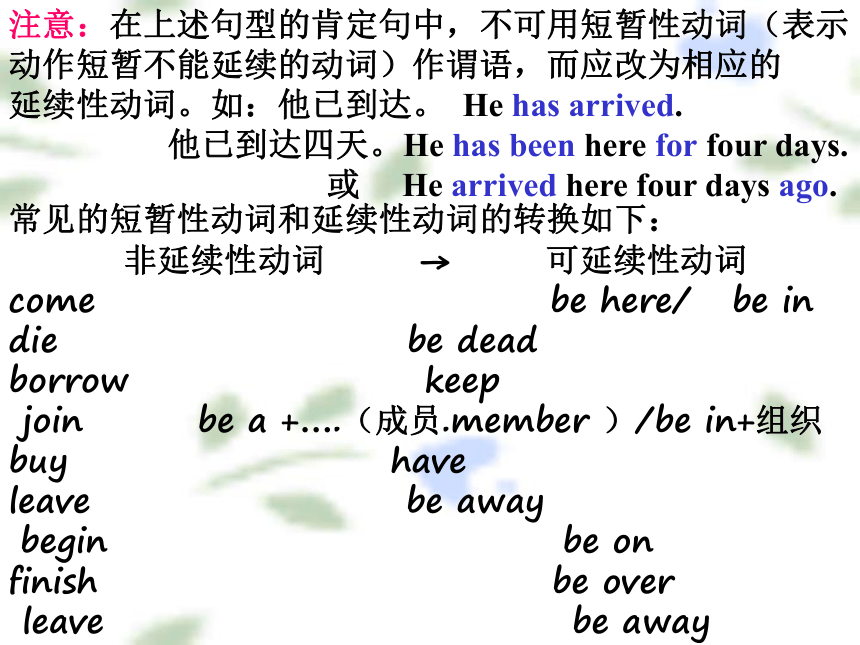
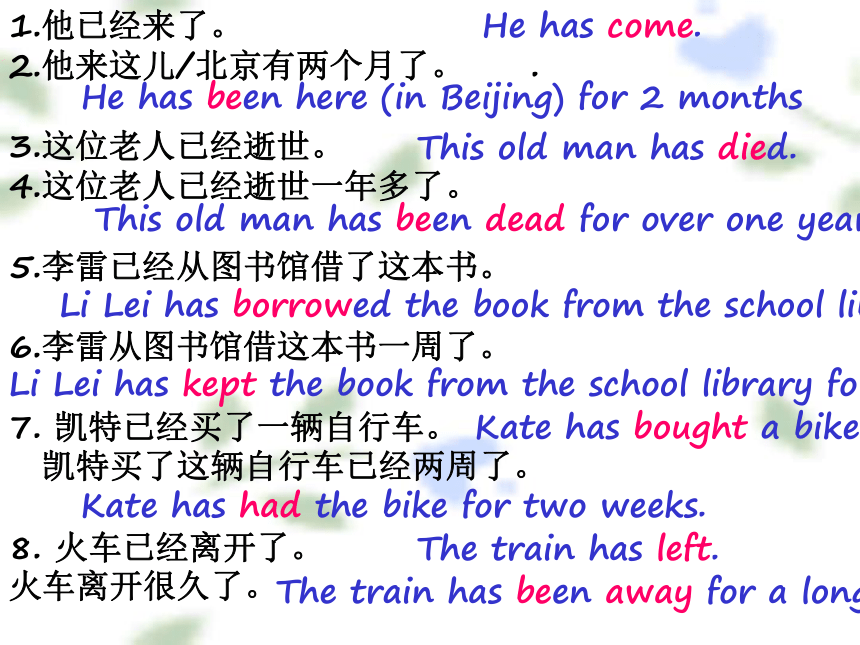
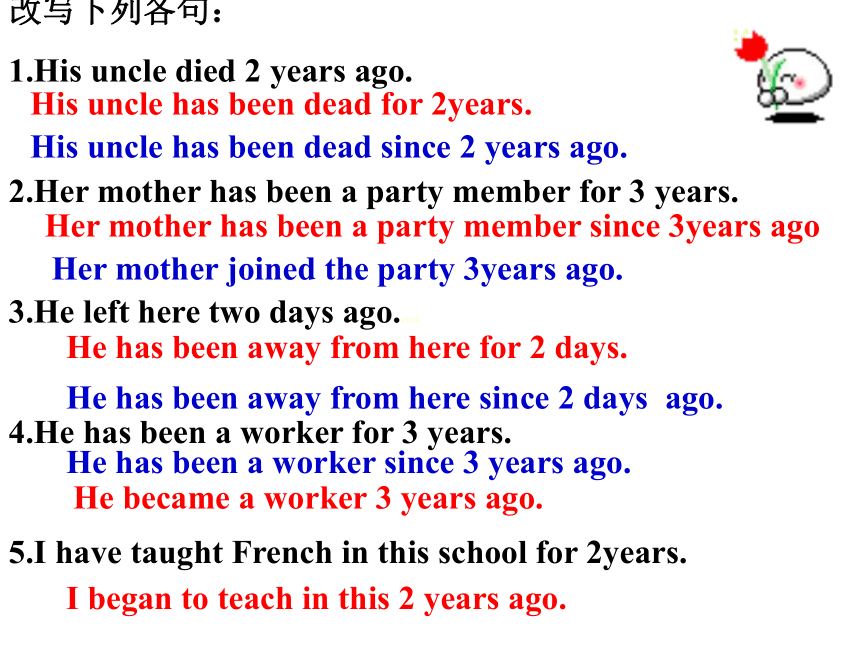
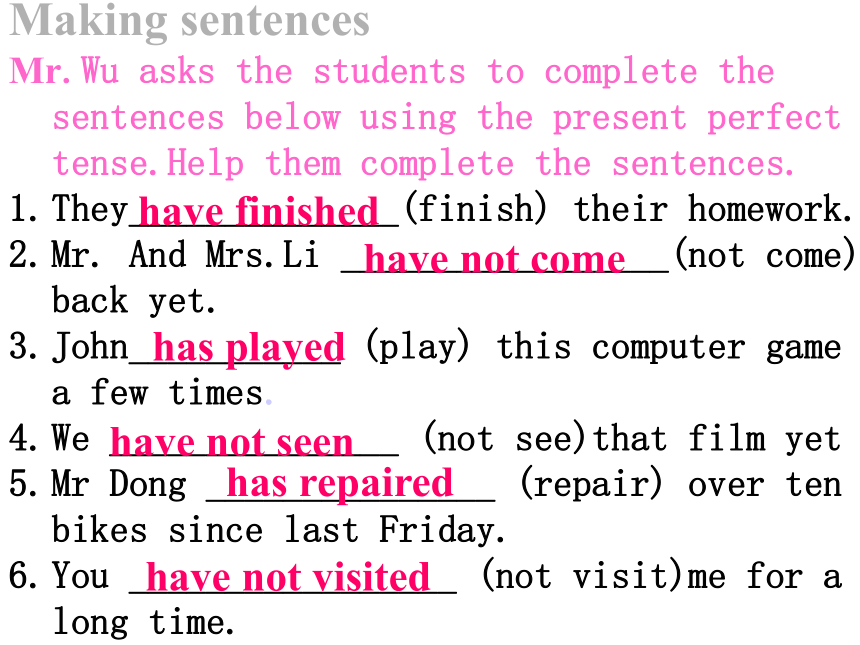
文档简介
课件21张PPT。现在完成时rammar Unit One现在完成时的时间副词和时间短语:1. 副词already和yet。already一般用于肯定句中,yet一般用于否定句和 疑问句中。
We have already finished our homework. 学科网
我们已完成作业了。 Have you finished your homework yet?
Not yet.你已经完成家庭作业了吗? - I have never been to the Great Wall.
我从未去过长城。2.副词ever 和never。多用于否定或疑问
句中,表示“曾经”或“从未“等。?
如: - Have you ever been to the Great
Wall?
你曾经去过长城吗?He has been there twice the past few years.
近几年他去过那里两次了。组卷网3. 用表示到说话为止的过去时间状语, 如 : just, before, up to now, the past few years
so far, by now等。
如: I have seen her before, but I can not
remember where. ? 我以前见过她,但记不起在哪里见过。他刚来.He has just come.How many English words have you learnt so far?迄今为止,你学了多少英语单词?B.表示过去已经开始,持续到现在的动作或状态,可以和表示从过去某一时刻开始, 一直延续到现在(包括现在在内,也许还要继续进行下去)的(段)时间状语连用。共有以下几种情况:与
for + 表示一段时间的词组连用;
since + 表示过去的时间点或从句连用。
例如:
1.我做教师已有二十年了。
2.她在这家工厂工作十年了。
3.她自从去年九月起就在这所学校。
4.自从三年前他就住在伦敦。 I've been a teacher for twenty years.She's worked in the factory for ten years. She's been at this school since last September.He‘s lived in London since three years ago.常见的短暂性动词和延续性动词的转换如下: 非延续性动词 → 可延续性动词 come be here/ be in die be dead
borrow keep join be a +….(成员.member )/be in+组织 buy have leave be away
begin be on
finish be over
leave be away注意:在上述句型的肯定句中,不可用短暂性动词(表示
动作短暂不能延续的动词)作谓语,而应改为相应的
延续性动词。如:他已到达。 He has arrived.
他已到达四天。He has been here for four days.
或 He arrived here four days ago. 1.他已经来了。 2.他来这儿/北京有两个月了。 .
3.这位老人已经逝世。 4.这位老人已经逝世一年多了。
5.李雷已经从图书馆借了这本书。
6.李雷从图书馆借这本书一周了。
7. 凯特已经买了一辆自行车。 凯特买了这辆自行车已经两周了。
8. 火车已经离开了。 火车离开很久了。 He has come.He has been here (in Beijing) for 2 monthsThis old man has died.This old man has been dead for over one year.Li Lei has borrowed the book from the school library.Li Lei has kept the book from the school library for a week. Kate has bought a bike.Kate has had the bike for two weeks.The train has left.The train has been away for a long time.改写下列各句:
1.His uncle died 2 years ago.
2.Her mother has been a party member for 3 years.
3.He left here two days ago.zxxk
4.He has been a worker for 3 years.
5.I have taught French in this school for 2years.His uncle has been dead for 2years. His uncle has been dead since 2 years ago.Her mother joined the party 3years ago.Her mother has been a party member since 3years agoHe has been away from here for 2 days.He has been away from here since 2 days ago.He has been a worker since 3 years ago.He became a worker 3 years ago.I began to teach in this 2 years ago.Making sentences
Mr.Wu asks the students to complete the sentences below using the present perfect tense.Help them complete the sentences.
They______________(finish) their homework.
Mr. And Mrs.Li _________________(not come) back yet.
John___________ (play) this computer game a few times.
We _______________ (not see)that film yet
Mr Dong _______________ (repair) over ten bikes since last Friday.
You _________________ (not visit)me for a long time.have finishedhave not comehas playedhave not seenhas repairedhave not visitedPractice1.Who has already been to Japan?
2.Who has never been to Japan?
3.Who has just been to Japan?
4.Who has already been to Britain?
5.Who has not been to Britain yet?
6.Who has not been to Hawaii yet?
7.Who has just been to Hawaii?
8.Who has already been to Hawaii?Ask and answer 表示曾去过某处have / has been的用法以及它们在疑问句、否定句中与ever、never连用。
例如: We have been to Qingdao . 我们去过青岛。 She has been to Sanya. 她去过三亚。
been to 与gone to表示某人去某处(还没有回来)用have / has gone,
例如:
Who has gone to Beijing? 谁去了北京? Her mother has gone to Hawaii.
她妈妈去了夏威夷了。have been (to)和have gone (to)的区别: have / has been (to) 表示“曾经去过”某地, 说话时此人很可能
不在那里, 已经回来. 侧重指经历。 z.x.x.khave / has gone (to) 表示某人“已经去了”某地, 说话时此人
在那里,或可能在路上, 反正不在这里。have / has been (in) 表示“来/去某地(多长时间)”, 现在仍在
那儿,强调状态。 He has been to Beijing (twice). 他曾去过北京(两次).
He has gone to Beijing. 他已经去了北京.
He has been in Beijing for three weeks. 他已经来/去北京三个
周了。1.你去过长城吗
2. 他爸爸去了广州了。
3.你爸爸去过颐和园吗?
4.我们从来没有去过北海公园。
5.李雷在哪儿?他到图书馆去了。
6.他从来没有去过大连。Have you ever been to the Great Wall?Has your father been to the Summer Palace? We have never been to the Beihai Park.He has never been to Dalian.PracticeHis father has gone to Guangzhou. Where is Li Lei? He has gone to the library 7.他在这儿/北京有两个月了。
8. 他父亲已经入党二十多年了。His father has been in the Party for over 20 years.
His father has been a Party member for over 20 years. He has been here (in Beijing) for 2 months. 中考链接一.选择填空 1、Uncle Dong is ______from time to time because he misses his old friends.
A. lonely B. alone C. happy D. unkind
2、Mr and Mrs Black ______ back _________.
A. hasn’t come, yet B. haven’t come , yet
C. haven’t , come already D. hasn’t come , already
3、We haven’t seen each other ________.
A. for a long time B. two days ago
C. for two days ago D. a long time ago.
4、It has been in service ________ 1998.
A. in B. at C. or D. since
5、It _______ seven years __________ Hong Kong return to China.
A. was, since B. is, since
C. was, after D. is , after6、--- Where are Mike and Jack?
---- They _______ the library.
A. have gone B. have been to
C. has been to D. has gone to
7、There is a new bridge _______ Sunshine Bridge.
A. call B. to call C. called D. calling.
8.I ____ you a happy holiday.
A. hope B. wish C. want D. like
9.I enjoy ________ my friends on the internet on Sundays.
A. chat B. chatting
C. chatting to D. chatting with.
10.In a dictionary which is always before tram.
A. train B. try C. tree D. true
11.The place _______ be the home of wild red cranes.
A. is used to B. used to
C. is used D. was used to
12.We hope you _______ a happy holiday in Hong Kong.
A. to have B. having C. had D. will have13.The old man was not ______ to climb up the hill.
A. healthy B. enough healthy
C. health enough D. healthy enough
14.------- _______ you _______ the book ______ to the library yet.
------ Yes. I have.
A. Have ,returned,/ B. Have, returned, back
C. Did return ,/ D. Did, return,back
15.He has _______ finished his homework. He’s now ______ a rest.
A. yet, having B. just, has
C. ever, has D. already, having.动 词 填 空:
1._____ you ________(clean) the room?
Yes, we __________(do) that already.
When _______ you ______(do) it?
We _______(do) it an hour ago.
2.______ he ______(see) this film yet? Yes.
When _____ he _____(see) it?
He ______ it last week.
3. How many times _____you______(be) there?
Havecleanedhave donediddodidHasseendidseesawhavebeen下一页上一页4. I __________ (read) the novel twice. It’s interesting.
5. She _________(go) to Pairs, hasn’t she? Yes.
How ______ she _______(go) there?
She _______(go) there by air.
6. So far, many countries _______________(develop)
their software programs.
7.Mr Chen ______(give)up smoking last year.
8.Mr chen __________(give) up smoking since last year.
have readhas gonedidgowenthave developedgavehas given下一页上一页1.他在这儿住了十年了.
2.自从离开学校到现在我写过两封信给他.
3.我们家乡发生了巨大变化.
4.我刚刚到这里.他刚才也在这里,但是现在他去图书馆了.
5.自两年前到现在我曾经去过北京两次.
6.他在北京呆了两个月.He has lived here for ten years.I have written to him twice since I left school.Great changes have taken place in our hometown .I have just arrived here. He was here just now. But now he has gone to the library.I have been to Beijing twice since two years ago.He has been in Beijing for two months.7.我上周感冒了.
我从上周以来就感冒了
8.我还没收到他的来信.I caught a cold last week.I have had a cold since last week.I haven’t heard from him yet.See you later!
We have already finished our homework. 学科网
我们已完成作业了。 Have you finished your homework yet?
Not yet.你已经完成家庭作业了吗? - I have never been to the Great Wall.
我从未去过长城。2.副词ever 和never。多用于否定或疑问
句中,表示“曾经”或“从未“等。?
如: - Have you ever been to the Great
Wall?
你曾经去过长城吗?He has been there twice the past few years.
近几年他去过那里两次了。组卷网3. 用表示到说话为止的过去时间状语, 如 : just, before, up to now, the past few years
so far, by now等。
如: I have seen her before, but I can not
remember where. ? 我以前见过她,但记不起在哪里见过。他刚来.He has just come.How many English words have you learnt so far?迄今为止,你学了多少英语单词?B.表示过去已经开始,持续到现在的动作或状态,可以和表示从过去某一时刻开始, 一直延续到现在(包括现在在内,也许还要继续进行下去)的(段)时间状语连用。共有以下几种情况:与
for + 表示一段时间的词组连用;
since + 表示过去的时间点或从句连用。
例如:
1.我做教师已有二十年了。
2.她在这家工厂工作十年了。
3.她自从去年九月起就在这所学校。
4.自从三年前他就住在伦敦。 I've been a teacher for twenty years.She's worked in the factory for ten years. She's been at this school since last September.He‘s lived in London since three years ago.常见的短暂性动词和延续性动词的转换如下: 非延续性动词 → 可延续性动词 come be here/ be in die be dead
borrow keep join be a +….(成员.member )/be in+组织 buy have leave be away
begin be on
finish be over
leave be away注意:在上述句型的肯定句中,不可用短暂性动词(表示
动作短暂不能延续的动词)作谓语,而应改为相应的
延续性动词。如:他已到达。 He has arrived.
他已到达四天。He has been here for four days.
或 He arrived here four days ago. 1.他已经来了。 2.他来这儿/北京有两个月了。 .
3.这位老人已经逝世。 4.这位老人已经逝世一年多了。
5.李雷已经从图书馆借了这本书。
6.李雷从图书馆借这本书一周了。
7. 凯特已经买了一辆自行车。 凯特买了这辆自行车已经两周了。
8. 火车已经离开了。 火车离开很久了。 He has come.He has been here (in Beijing) for 2 monthsThis old man has died.This old man has been dead for over one year.Li Lei has borrowed the book from the school library.Li Lei has kept the book from the school library for a week. Kate has bought a bike.Kate has had the bike for two weeks.The train has left.The train has been away for a long time.改写下列各句:
1.His uncle died 2 years ago.
2.Her mother has been a party member for 3 years.
3.He left here two days ago.zxxk
4.He has been a worker for 3 years.
5.I have taught French in this school for 2years.His uncle has been dead for 2years. His uncle has been dead since 2 years ago.Her mother joined the party 3years ago.Her mother has been a party member since 3years agoHe has been away from here for 2 days.He has been away from here since 2 days ago.He has been a worker since 3 years ago.He became a worker 3 years ago.I began to teach in this 2 years ago.Making sentences
Mr.Wu asks the students to complete the sentences below using the present perfect tense.Help them complete the sentences.
They______________(finish) their homework.
Mr. And Mrs.Li _________________(not come) back yet.
John___________ (play) this computer game a few times.
We _______________ (not see)that film yet
Mr Dong _______________ (repair) over ten bikes since last Friday.
You _________________ (not visit)me for a long time.have finishedhave not comehas playedhave not seenhas repairedhave not visitedPractice1.Who has already been to Japan?
2.Who has never been to Japan?
3.Who has just been to Japan?
4.Who has already been to Britain?
5.Who has not been to Britain yet?
6.Who has not been to Hawaii yet?
7.Who has just been to Hawaii?
8.Who has already been to Hawaii?Ask and answer 表示曾去过某处have / has been的用法以及它们在疑问句、否定句中与ever、never连用。
例如: We have been to Qingdao . 我们去过青岛。 She has been to Sanya. 她去过三亚。
been to 与gone to表示某人去某处(还没有回来)用have / has gone,
例如:
Who has gone to Beijing? 谁去了北京? Her mother has gone to Hawaii.
她妈妈去了夏威夷了。have been (to)和have gone (to)的区别: have / has been (to) 表示“曾经去过”某地, 说话时此人很可能
不在那里, 已经回来. 侧重指经历。 z.x.x.khave / has gone (to) 表示某人“已经去了”某地, 说话时此人
在那里,或可能在路上, 反正不在这里。have / has been (in) 表示“来/去某地(多长时间)”, 现在仍在
那儿,强调状态。 He has been to Beijing (twice). 他曾去过北京(两次).
He has gone to Beijing. 他已经去了北京.
He has been in Beijing for three weeks. 他已经来/去北京三个
周了。1.你去过长城吗
2. 他爸爸去了广州了。
3.你爸爸去过颐和园吗?
4.我们从来没有去过北海公园。
5.李雷在哪儿?他到图书馆去了。
6.他从来没有去过大连。Have you ever been to the Great Wall?Has your father been to the Summer Palace? We have never been to the Beihai Park.He has never been to Dalian.PracticeHis father has gone to Guangzhou. Where is Li Lei? He has gone to the library 7.他在这儿/北京有两个月了。
8. 他父亲已经入党二十多年了。His father has been in the Party for over 20 years.
His father has been a Party member for over 20 years. He has been here (in Beijing) for 2 months. 中考链接一.选择填空 1、Uncle Dong is ______from time to time because he misses his old friends.
A. lonely B. alone C. happy D. unkind
2、Mr and Mrs Black ______ back _________.
A. hasn’t come, yet B. haven’t come , yet
C. haven’t , come already D. hasn’t come , already
3、We haven’t seen each other ________.
A. for a long time B. two days ago
C. for two days ago D. a long time ago.
4、It has been in service ________ 1998.
A. in B. at C. or D. since
5、It _______ seven years __________ Hong Kong return to China.
A. was, since B. is, since
C. was, after D. is , after6、--- Where are Mike and Jack?
---- They _______ the library.
A. have gone B. have been to
C. has been to D. has gone to
7、There is a new bridge _______ Sunshine Bridge.
A. call B. to call C. called D. calling.
8.I ____ you a happy holiday.
A. hope B. wish C. want D. like
9.I enjoy ________ my friends on the internet on Sundays.
A. chat B. chatting
C. chatting to D. chatting with.
10.In a dictionary which is always before tram.
A. train B. try C. tree D. true
11.The place _______ be the home of wild red cranes.
A. is used to B. used to
C. is used D. was used to
12.We hope you _______ a happy holiday in Hong Kong.
A. to have B. having C. had D. will have13.The old man was not ______ to climb up the hill.
A. healthy B. enough healthy
C. health enough D. healthy enough
14.------- _______ you _______ the book ______ to the library yet.
------ Yes. I have.
A. Have ,returned,/ B. Have, returned, back
C. Did return ,/ D. Did, return,back
15.He has _______ finished his homework. He’s now ______ a rest.
A. yet, having B. just, has
C. ever, has D. already, having.动 词 填 空:
1._____ you ________(clean) the room?
Yes, we __________(do) that already.
When _______ you ______(do) it?
We _______(do) it an hour ago.
2.______ he ______(see) this film yet? Yes.
When _____ he _____(see) it?
He ______ it last week.
3. How many times _____you______(be) there?
Havecleanedhave donediddodidHasseendidseesawhavebeen下一页上一页4. I __________ (read) the novel twice. It’s interesting.
5. She _________(go) to Pairs, hasn’t she? Yes.
How ______ she _______(go) there?
She _______(go) there by air.
6. So far, many countries _______________(develop)
their software programs.
7.Mr Chen ______(give)up smoking last year.
8.Mr chen __________(give) up smoking since last year.
have readhas gonedidgowenthave developedgavehas given下一页上一页1.他在这儿住了十年了.
2.自从离开学校到现在我写过两封信给他.
3.我们家乡发生了巨大变化.
4.我刚刚到这里.他刚才也在这里,但是现在他去图书馆了.
5.自两年前到现在我曾经去过北京两次.
6.他在北京呆了两个月.He has lived here for ten years.I have written to him twice since I left school.Great changes have taken place in our hometown .I have just arrived here. He was here just now. But now he has gone to the library.I have been to Beijing twice since two years ago.He has been in Beijing for two months.7.我上周感冒了.
我从上周以来就感冒了
8.我还没收到他的来信.I caught a cold last week.I have had a cold since last week.I haven’t heard from him yet.See you later!
